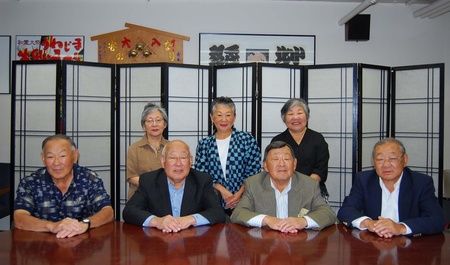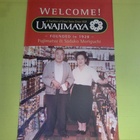Around the time of moving to King Street in 1970, the Moriguchi family's Uwajimaya diversified beyond retail sales. In 1966, they started a food wholesale division. They named the store Seasia, derived from Seattle Asia.
The company sold imported goods from Japan and other Asian countries to supermarkets and other stores that handled Asian foods, as well as restaurants. This division was run by Moriguchi's third son Akira and fourth son Toshi (Toshikatsu). The business gained momentum and expanded when it began selling to QFC, a chain store in the University District, where the University of Washington is located.
In 1983, the company launched Kustom Foods, a division that produced sushi and other foods and sold them to supermarkets and restaurants, and in 1988, it launched Food Services International, a division that sold meat, vegetables, and groceries to local Asian restaurants and grocery stores.
As for its main business, Uwajimaya, it opened a store in Beaverton, Oregon in 1998. Then, in 2000, it opened a new wing called Uwajimaya Village, located just south of the main store.
In addition to the shops covering an area of 6,200m2, there is a gift corner and a large food court, and the building also houses the Kinokuniya bookstore, a bank, an eyeglass store, etc. The upper part of the building is a complex of apartment buildings housing 176 units.
Two years later, in July 2002, Sadako Moriguchi, the "mother" who supported the Moriguchi family and wife of founder Fujimatsu Moriguchi, passed away at the age of 94. This was 74 years after Fujimatsu came to America alone from Ehime and started the business as a small grocery store in Tacoma.
In the past, there were many stores selling Japanese food in cities with Japanese communities on the American West Coast, but many of them disappeared due to war or generational changes that made it impossible to continue, or because they could not accommodate the changing customer base over time.
There were several reasons why Uwajimaya was able to continue operating under these circumstances, but the most important one is the family solidarity between the Moriguchi couple Fujimatsu and Sadako and their children of the next generation.
In each relationship
The Moriguchi family had seven children, Kenzo, the eldest, Suwako, Tomio, Akira, Hisako, Toshi (Toshikatsu), and Tomoko. Six of them, except for Hisako, have been involved in the management of Uwajimaya in some way. Hisako also contributed to the company by working at the store during her student days at the Seattle World's Fair.
Each of the children helped out in the store under their parents from a young age, and continued to support Uwajimaya in their own way after they became adults.

Kenzo, the eldest son, helped his father with his work from the time of the Tacoma store. When Fujimatsu went out to "peddle" in a truck to the sites where Japanese people were working, he accompanied him and even slept on the truck's luggage.
Since then, except for a period when he was in the military, he has been consistently involved in the management of Uwajimaya. Perhaps due to his sense of responsibility as the eldest son, he was a careful and reliable person. Similarly, the second son, Tomio, supported his parents from a young age, including his school days, and after Fujimatsu's death, he became the president and developed Uwajimaya.
The eldest daughter, Suwako, was educated in Japan before the war and returned to Japan after the war to help with the housework. In accordance with Fujimatsu's traditional Japanese educational policy that "women do not need to go to university," she started working after graduating from high school and took up various jobs. In 1965, after the couple got married and their third child was two years old, she began helping out at the store.
After a while, she was put in charge of purchasing gift items for the store. Having been in Japan, she was better at reading and writing Japanese than any of the seven of us, so she was tasked with going to Japan to purchase products.
Akira, the third son, who was in charge of the wholesale department, was an unusual presence among the seven in a different sense to Suwako. His other brothers and sisters saw him as a free-spirited character, a playboy and a gambler. He was said to be cool, smart and frank. He studied electrical engineering at the University of Washington, and served in the Army for a time in the parachute unit and was stationed in Germany.
While he was involved in the management of Uwajimaya, he also launched a restaurant chain and had an entrepreneurial spirit. Perhaps because he was known as a gambler, he was the type of person who took risks and moved forward. Unfortunately, he passed away in 2012 at the age of 73.
Hisako, the second daughter, also helped out with various aspects of the store's work, such as making satsumaage (fried fish cakes) for her father from an early age, wrapping tea for funerals, and sorting the products. She went to the University of Washington to study apparel design, and after working in San Francisco, she began teaching apparel and fashion at the University of Alameda. Later, when her husband started working at Uwajimaya, she moved to Seattle and taught apparel design at a community college in 1978, sending many students into the industry.
Knowing that she was happy with her teaching job, her brothers had not asked her to get involved in Uwajimaya's work.
"He was small and active, had a great talent for making clothes, and was well-liked by the students. He never said a bad thing about anyone. He was kind to everyone," says his younger brother, Toshi.
On the other hand, Hisako evaluates Toshi this way: "He was smart, mathematically inclined, and because he was smart, his parents treasured him." He also helped out with the family business from a young age. During high school, he would go straight home after school and work in the store, so he didn't have the campus experience that his classmates remember.
He was the first of the brothers to leave Seattle and study at Reed College in Oregon, the same school Steve Jobs attended. He then studied at the University of Washington and other institutions before joining Uwajimaya. He first worked in the management of the store in South Center, and later supported his brother Akira in running the wholesale business Sea Asia.
Tomoko, the youngest, also worked the cash register, stocked the shelves, washed dishes, and cooked meals for the employees after school. After studying graphic arts at the University of Washington, she worked at an art agency in San Francisco, with the goal of becoming a commercial art specialist. After getting married and having two daughters, her older sister Hisako, who was in Berkeley, decided to move back to Seattle, so Tomoko thought, "Well, then we should move to Seattle too," and returned.
There, she began using her expertise to work in Uwajimaya stores, taking charge of areas such as display and advertising.
As you can see, each of them is involved with Uwajimaya in various ways. Although they may have heated arguments or fights at times, having seen their parents' hardships and having experienced the work of the store firsthand since childhood has created unity and harmony among the seven of them, and is the force that keeps Uwajimaya going.
(Titles omitted)
© 2018 Ryusuke Kawai






